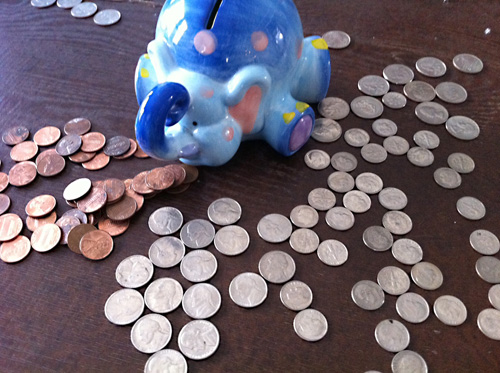I want my children to learn the value of saving and spending wisely so they grow up knowing how to manage their own money while being a socially responsible citizen. This isn’t an easy process but by starting early, children have a better chance of developing good money habits that will last into adulthood.
 Once my boys turned eight (around the time they started receiving a weekly allowance) we started an annual New Year’s tradition of counting the money in their piggy bank and dividing it into 3 equal parts:
Once my boys turned eight (around the time they started receiving a weekly allowance) we started an annual New Year’s tradition of counting the money in their piggy bank and dividing it into 3 equal parts:
- SAVE (in a bank account in their name to be used later–for a car, college, etc.)
- SPEND (on what they want–money that stays in their piggy bank until they want to purchase something such as trading cards or movie snacks or saved towards a bigger purchase)
- SHARE (with an organization of their choosing that needs/benefits from donations)
My boys save money in a traditional piggy bank with one compartment. If you want a more visual way for children to keep track of their money during the year, buy a bank with multiple slots or make your own SAVE, SPEND, SHARE bank by labeling 3 jars.
With each passing year my kids are better able to sort the money, do the math needed to add up and divide the total amount into 3 equal parts (or rounding to roughly 3 equal parts) and take a more active role in deciding where to donate their money.
The first two years’ SHARE money went to the National MS Society chosen because we have family and friends with this disease and the boys hope by contributing to MS research we get closer to finding a cure or way to delay the MS symptoms. This year, both boys decided to donate their money to 3 different places they felt passionate about. Their choices represent organizations both local and national and things that will benefit them directly and indirectly:
- National MS Society: For the reasons mentioned above.
- Their elementary school (via Donors Choose). The 4th grade classes at their school are trying to raise money to buy an overhead projector to enhance classroom learning and the boys want to help make it happen. They know that they and their classmates will benefit from this donation.
- Providence Children’s Film Festival (PCFF). My boys love film and have been attending and blogging about this festival since it started in 2010. In 2011 they started volunteering their time to review movies for it as well. They know PCFF is run by an all-volunteer staff and would miss the festival if it no longer existed.
Although their checks were small (@$10 from each boy to each organization=@$60) the donations were a large chunk of the money the boys had accumulated over the year. I believe the donated money was easier to part with and more meaningful to them when they were empowered to choose where their money went. The boys’ friends have donated their money to a number of different organizations including the Zoo, the Sierra Club, Animal Rescue League, the Food Bank and various National Disaster relief missions. There is no right answer on where to SHARE the money, more important to involve kids in the research, decision and follow through process of making the donation.
Teach Kids the Basics
Starting in the elementary school years, teach kids the basics of counting actual coins or bills and how to tell the difference between a nickel and a quarter. Make a game out of using real coins to demonstrate math concepts and show how much something costs.
Families handle money in different ways and I’m always curious how things work in other homes. Allowance is a big topic of conversation amongst parents–whether to give allowance at all or the amount of and strings attached to the money varies greatly. Some parents reward kids for completing extra chores that fall outside the realm of their regular tasks. If they are expected to make their beds and keep their rooms clean, then they can earn money for doing something extra such as raking leaves. Some parents do not give allowance and see chores as job opportunities for kids, each one to be negotiated as a separate business contract.
These are small but meaningful steps to help our children become socially responsible money savvy citizens.
Additional Resources
The Family Education website has a games and tips designed to help kids learn about the value of money.









